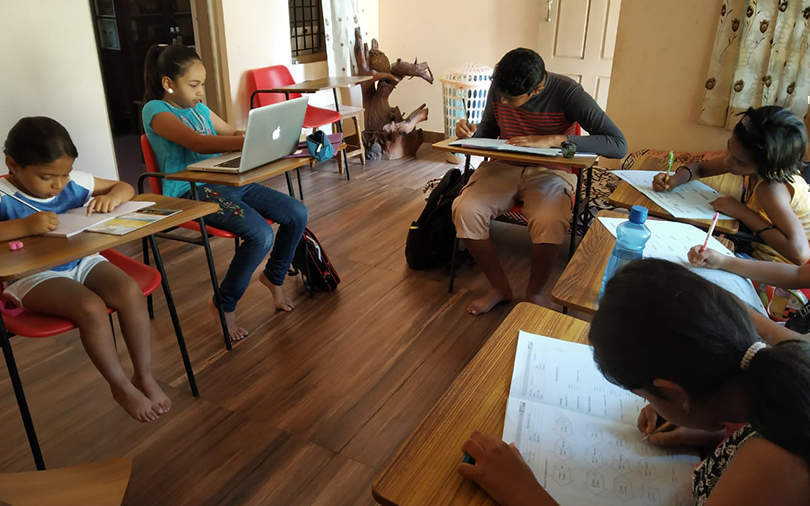
This startup is bringing AI to the rescue of kids afraid of maths


CarveNiche Technologies believes that artificial intelligence and data analytics can help children overcome one of their biggest fears: mathematics. The Bengaluru-based ed-tech startup is embedding technology in its products in the hope of both evaluating and improving students’ grasp of numbers.
After more than a decade in the IT sector, including stints at the Tata group and Infosys, Avneet Makkar incorporated CarveNiche Technologies Pvt. Ltd in 2010. The initial focus was on personalised learning for K-12 education.
“Technology was slowly moving into the classroom and that was the genesis of our idea to open CarveNiche Technologies so that we could help in providing better education to kids,” Makkar told TechCircle.

Among the first steps was to create a customised curriculum for students that could serve as an online self-learning program for grades 1 to 10 covering mathematics, science and social sciences. Makkar hired a few teachers from the US to help create this content and built a team of 35 people which included designers and visualisers.
The product development phase lasted two years. Schools and NGOs liked the product, called WisdomLeap, but Makkar struggled with scale as sales and training emerged as pain points.
The pivot

After facing growth pangs, Makkar turned her attention to introducing a product called beGalileo which was inspired the WisdomLeap experience.
“When we were selling WisdomLeap, mathematics came up as a demand and so we decided to come out with a product that was focused on the subject,” Makkar said.
Makkar changed the composition of the team by hiring subject matter experts (eight core members and other teachers as and when needed) and designers. But this time, Makkar delved deeper into the subject and created levels of learning in terms of questions, knowledge and testing, among other aspects.

AI was weaved into the product in order to understand a child’s pace of learning and provide guidance accordingly. But in order for the AI to understand the student and level of learning, it needed to run a test. That’s why MIDAS was introduced.
“MIDAS is a scientifically-designed diagnostic assessment for mathematics that takes one hour to complete. It also can help students prepare for school and Olympiad exams,” Makkar said.
MIDAS’s AI engine reads a child’s ability to understand questions, carry out basic calculations such as addition, subtraction, multiplication and division, and the level of proficiency in the subject.

“The AI achieves this by assimilating the child’s work into all the questions that are fashioned in a way that the results are understood by the machine,” she said.
These results then drive the learning format in beGalileo. “Once the test is conducted, the AI in beGalileo knows where to begin the child’s training and what kind of questions should follow,” Makkar said.
After developing beGalileo, Makkar went around elite schools two years ago to test out the product and further train the AI. It was officially launched last year and Makkar decided to experiment with marketing. She started selling franchises of the products to women teachers around different cities such as Bengaluru, Mumbai and Chennai to promote earning opportunities.

“There are a lot of women who are taking breaks from their careers and would want to work from home,” said Makkar. “At these franchises, students come to study in groups as they would in a tuition or coaching class but the teacher here is just monitoring, since beGalileo does most of the teaching.”
Makkar said that in all there are close to 700 centres spread across Indian cities. CarveNiche is slowly expanding beGalileo’s footprint in the US, too, and has opened two centres in Dallas recently.
To be sure, CarveNiche isn’t the only Indian startup addressing this issue. It faces competition in the form of Bodhi AI, Oust Labs, EduCommerce Technologies and GyaanZone.com.

Funding and revenue
CarveNiche Technologies had raised $500,000 from Manoj Swain in its year of inception before securing Rs 1 crore in 2012 from Mumbai Angels. In 2016, it raised an undisclosed amount from Calcutta Angels, Lead Angels and a bunch of high net worth individuals (HNIs) it did not name.
CarveNiche earns 40% of its revenue via the franchise model. It reported total income of Rs 70 lakh for the year ended March 2018, nearly a 10% increase from the previous fiscal. Losses dipped to Rs 34 lakh from Rs 47 lakh in 2016-17.
Lead Angels founder and CEO Sushanto Mitra said that CarveNiche has more than doubled its revenues by establishing a presence in key geographies including the US markets and it foresees such growth continuing via its scalable delivery model. He said that Lead Angels expects an Internal Rate of Return (IRR) of 50% on its investment in CarveNiche.
Meanwhile, WisdomLeap, which was made available online through a portal and via a pen drive for areas with poor connectivity, is currently operating on a freemium model. Makkar said that students are charged for group classes and preparation tests and some content is paid too.
